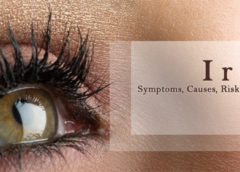Iritis (i-RYE-is) swells and irritates (inflammation) in the coloured ring around the pupil (iris) of your eye. Another name for the iritis is uveitis anterior.
The uvea is the central layer of the eye between the retina and the eye’s white part. The iris is in the front (anterior) portion of the uvea.
Iritis is the most common type of uveitis. Uveitis is inflammation of part of or all of the uvea. The cause is often unknown. It can result from a condition or genetic factor that underlies it.
If untreated, iritis can cause glaucoma or loss of vision. If you have iritis symptoms see your doctor as soon as possible.
Iritis Symptoms
Iritis usually comes on quickly and most often affects only one eye. Signs and symptoms may include:
- Pain in your eye or brow area
- Severe eye pain in bright light
- Redness, especially around your iris
- An unusually small or strangely shaped pupil
- Blurry vision or vision loss
- Headache
Causes
Iritis has many causes. Most of the time, the inflammation is idiopathic (that is, of unknown cause). The acute iritis in such cases can occur only once in a person’s life.
Iritis may be related to several diseases, including many systemic illnesses. This is often recurrent in these cases.
- Infection such as herpes simplex virus, herpes zoster virus (shingles), tuberculosis, syphilis, and others
- Inflammation following eye surgery
- Sarcoidosis
- Adamantiades-Behcet disease, in which the inflammation of the uveal tissue centres around the blood vessels
- Inflammatory bowel disease, particularly ulcerative colitis and Crohn’s disease
- Some drugs have been associated with iritis (for instance, analogue drugs for prostaglandin glaucoma)
- Ocular injury may lead to traumatic iritis. Rarely, a history of previous trauma to the other eye can cause the non-traumatized eye to develop delayed onset iritis.
- • Autoimmune conditions such as juvenile rheumatoid arthritis, HLA-B27-associated diseases such as ankylosing spondylitis and vascular collagen diseases such as lupus
- More posterior uveitis (e.g., intermediate uveitis and choroiditis) with inflammatory cells spilling over into the anterior chamber (front part of the eye) may mimic iritis. Similarly, a retinal detachment in the anterior chamber can create a spillover of pigment and cells which could also mimic iritis.
Risk factors
Your risk of developing iritis increases if you:
- Have a specific genetic alteration. People with a particular gene alteration that is necessary for the safe functioning of the immune system are more likely to develop iritis. This change is labelled HLA-B27.
- Develop a sexually transmitted infection. Some infections, like as syphilis, or HIV / AIDS, are associated with significant iritis risk.
- Have a weakened immune system or an autoimmune disorder. This includes conditions such as ankylosing spondylitis and reactive arthritis.
- Smoke tobacco. Studies have shown that smoking contributes to your risk.
What are the possible complications of iritis?
With quick treatment, iritis often goes away without causing any other problems. But some people do have complications from iritis.
Possible complications from iritis include:
- Cataracts
- Calcium deposits on your cornea (band keratopathy)
- Inflammation of the fluid in the middle of your eye
- Inflammation of the retina, that lines the back of the eye
- Abnormal iris adhesion to other ocular structures (synechiae)
- Optic nerve damage in severe cases, causing blindness
- Raised pressure inside your eye (glaucoma)
- Swelling of the central portion (macular oedema) of the retina
Those complications can cause partial or total loss of vision if severe. Your eye care professional should try to avoid these complications with prompt treatment of your iritis. This often requires frequent dosing of medicines to bring the inflammation down.
You might need medicines to treat complications such as glaucoma. In severe cases, you may need surgery to treat one of these complications. For example, you may need surgery to remove a cataract or to fix your cornea.
Your risk of complications may vary based on your age, your other health conditions, and the cause of your iritis.
Are There Home Remedies for Iritis?
Mild analgesics may help temporarily until you can see the ophthalmologist.
Iritis needs prescription medicines (drops, pills or a combination) and follow-up visits with an ophthalmologist too, so it is essential to seek medical care.
- Use prescription medications exactly as prescribed.
- Wear dark glasses if exposure to light is uncomfortable.
- Take mild analgesics, such as acetaminophen (Tylenol) or ibuprofen (Advil), to help control some of the discomforts.

Leave a Reply
You must be logged in to post a comment.